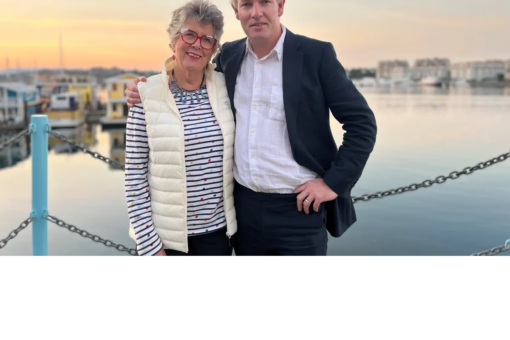Danny Kruger MP “does not speak for us” on assisted dying, constituents declare

- More than 100 locals sign open letter condemning MP’s attempts to block law change
- Comes as landmark assisted dying documentary fronted by Kruger and mother Dame Prue Leith airs today
More than 100 constituents of Danny Kruger, Conservative MP for Devizes, have signed an open letter condemning his staunch opposition to a change in the law on assisted dying – a position they declare does not represent them or their views.
Dozens of local people, many of whom have “witnessed loved ones suffer against their wishes despite good care” say they believe the UK’s blanket ban on assisted dying “must – and will – change” and accuse Mr Kruger and others who attempt to block such reform of “turning a blind eye to the pain, suffering and lasting trauma” caused by the current law.
It comes as ‘Prue and Danny’s Death Road Trip’ airs tomorrow evening on Channel 4 – a documentary which sees Mr Kruger and his mother, Dame Prue Leith, Great British Bake Off judge and patron of Dignity in Dying, explore the assisted dying laws of North America from opposite ends of the debate.
The open letter reads: “Things must change for dying people in this constituency and beyond. Instead of scaremongering about other country’s laws, Mr Kruger must wake up to the devastation going on on his own doorstep.”
‘Prue and Danny’s Death Roadtrip’ is broadcast as the Health and Social Care Committee conducts the first ever House of Commons inquiry into assisted dying, with legislative proposals progressing in Scotland, Jersey, the Isle of Man, the Republic of Ireland and France.
The British public overwhelmingly supports law change on assisted dying, with a 2019 poll finding 84% are in favour of changing the law to allow terminally ill, mentally competent adults in their final months of life the choice to die on their own terms alongside high-quality end-of-life care. Similar laws for dying people are in place in states across the US, Australia and throughout New Zealand, with broader laws in place in Canada and several European countries.
Sarah Wootton, Chief Executive of Dignity in Dying, said:
“Mr Kruger’s staunch opposition to assisted dying is out of step with the people he is meant to represent, and indeed the vast majority of the British public. Many have seen the harms done by the current law and know it needs urgent change.
“A belief in the sanctity of life should not come at a cost to the beliefs and rights of others, including the terminally ill people who under the current law are denied the choice to die on their own terms and are instead faced with the unimaginable choice between suffering, suicide or Switzerland.
“Millions of people around the world now have this option, with Jersey, Isle of Man and Scottish Parliaments considering legislation. Westminster is at a crossroads: doing nothing is still a choice, one where Parliament turns a blind eye to the damage caused by the current law. Or, it can choose instead to listen to the public, look at the evidence and recognise that reform is necessary and popular. We can and should craft a British assisted dying law that gives our dying citizens the choice and protection they deserve.”
Assisted dying is banned across the British Isles. It is currently a crime in England and Wales under the Suicide Act 1961, which states that a person found guilty of “assisting or encouraging a suicide” can be imprisoned for up to 14 years. People who survive an attempt to take their own life alongside a loved one could be charged with manslaughter and others who offer more direct assistance could be charged with murder.
Data from the Office for National Statistics (ONS) has indicated that people with serious and potentially terminal illnesses are more than twice as likely to take their own lives than those without, with Dignity in Dying research estimating that up to 650 terminally ill people every year take their own lives. This is in addition to the pre-pandemic average of 50 Brits a year who travel to Switzerland for an assisted death (costing at least £10,000 and risking prosecution for loved ones who accompany an individual) and 6,400 people a year who would die in pain even with universal access to hospice care (as estimated by the Office of Health Economics).